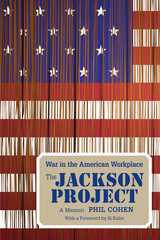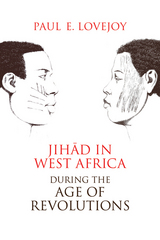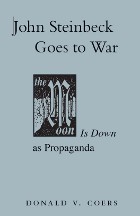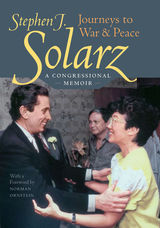5 start with J start with J

In this riveting memoir, Cohen takes the reader from the union hall and factory gates to the bargaining table and courtroom, and ultimately to the picket line. We see him winning the trust of disillusioned union members, negotiating with a hostile employer and its high-powered legal counsel, and hitting the pavement with leaflets and union cards in hand. We get to know the millworkers with whom he formed close bonds, including a stormy romance with a young woman at the plant. His up-close account of the struggle brims with telling descriptions of the negotiating process, the grinding work at the textile mill, the lives of its employees outside the workplace, and the grim realities of union busting in America. When the organizer’s four-year-old daughter accompanies him to the field, a unique an unexpected dimension is added to the chronicle.
A compelling, dramatic story that alternated between major triumphs and frustrating setbacks, The Jackson Project provides a rare look at the labor movement in the American South from an insider’s perspective.

Japan's Economy in War and Reconstruction was first published in 1949. Minnesota Archive Editions uses digital technology to make long-unavailable books once again accessible, and are published unaltered from the original University of Minnesota Press editions.
Dr. Cohen's substantial monograph is a carefully documented account of Japan's economic development from 1937 to 1949. It describes with much statistical evidence a remarkable experiment in planned industrial expansion prior to 1941, then continues with a survey of the war years, showing both the successes and failures of the planning, controlling, financing, and developing of Japan's war industries.
The last part of the book deals with the post-war problems of Japan from the war's end to the latter part of 1948—three years of occupation by the Allied Powers. Dr. Cohen discusses the three key economic factors: the basic reforms, the rapidly mounting inflation, and the slowly increasing, but still low level of production.
Dr. Cohen's first chapter is devoted to the careful planning of the years before the war. The next chapters discuss Japan's efforts to cope with the problems of munitions, food supply, and labor as the Allied war effort gradually wore her down. There are detailed studies of separate industries, shipping, and agriculture, and a discussion of the parts played respectively by air, sea, and land operations in the destruction of Japan's ability to wage successful war.
One of the main theses of these chapters is that the increasingly enveloping blockade of Japan shut off necessary industrial raw materials, and so brought Japanese war production to a virtual standstill before the main weight of the strategic air attack was delivered, and so made it impossible for Japan to continue the war.
The author's grim picture of inter-service quarrels and overlapping and inconsistent controls demonstrates that the Japanese army, navy, and civil service, in spite of their reputation for exact and strict organization, in practice failed to make good use of their unlimited powers.

In Jihād in West Africa during the Age of Revolutions, a preeminent historian of Africa argues that scholars of the Americas and the Atlantic world have not given Africa its due consideration as part of either the Atlantic world or the age of revolutions. The book examines the jihād movement in the context of the age of revolutions—commonly associated with the American and French revolutions and the erosion of European imperialist powers—and shows how West Africa, too, experienced a period of profound political change in the late eighteenth through the mid-nineteenth centuries. Paul E. Lovejoy argues that West Africa was a vital actor in the Atlantic world and has wrongly been excluded from analyses of the period.
Among its chief contributions, the book reconceptualizes slavery. Lovejoy shows that during the decades in question, slavery expanded extensively not only in the southern United States, Cuba, and Brazil but also in the jihād states of West Africa. In particular, this expansion occurred in the Muslim states of the Sokoto Caliphate, Fuuta Jalon, and Fuuta Toro. At the same time, he offers new information on the role antislavery activity in West Africa played in the Atlantic slave trade and the African diaspora.
Finally, Jihād in West Africa during the Age of Revolutions provides unprecedented context for the political and cultural role of Islam in Africa—and of the concept of jihād in particular—from the eighteenth century into the present. Understanding that there is a long tradition of jihād in West Africa, Lovejoy argues, helps correct the current distortion in understanding the contemporary jihād movement in the Middle East, Afghanistan, Pakistan, and Africa.

In March 1942, a desperate period for the allies in World War II, John Steinbeck published his propaganda novel The Moon is Down—the story of ruthless invaders who overrun a militarily helpless country. Throughout the novel, Steinbeck underscored both the fatal weakness of the “invincible” unnamed aggressors and the inherent power of the human values shard by the “conquered” people.
The Moon is Down created an immediate sensation among American literary critics; fierce debate erupted over Steinbeck’s uncommonly sympathetic portrayal of the enemy and the novel’s power as a vehicle for propaganda. Fifty years later, Coers continues the debate, relying heavily on unpublished letters and personal interviews with the lawyers, book dealers, actors, publishers, and housewives associated with the resistance movements in Western Europe. Clandestine translations of The Moon Is Down quickly appeared and were widely circulated under the noses of the Gestapo. Coers documents the fate of Steinbeck’s novel in the hands of World War II resistance fighters and deepens our appreciation of Steinbeck’s unique ability to express the feelings of oppressed peoples.

READERS
Browse our collection.
PUBLISHERS
See BiblioVault's publisher services.
STUDENT SERVICES
Files for college accessibility offices.
UChicago Accessibility Resources
home | accessibility | search | about | contact us
BiblioVault ® 2001 - 2024
The University of Chicago Press









